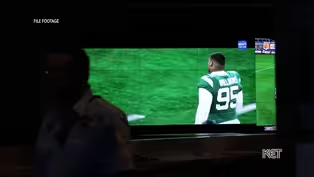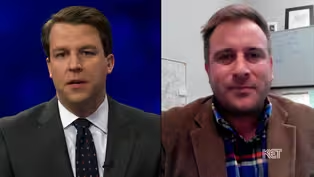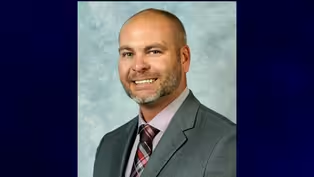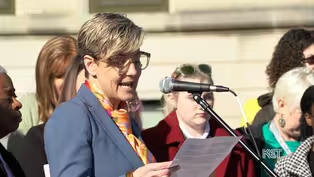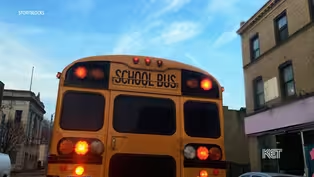
Telehealth Benefitial in Treating Addiction
Clip: Season 2 Episode 145 | 4mVideo has Closed Captions
a combination of Telehealth visits and the drug buprenorphine has shown promising ...
According to a recent study from the University of Kentucky, a combination of Telehealth visits and the drug buprenorphine has shown promising results in treating addiction.
Problems playing video? | Closed Captioning Feedback
Problems playing video? | Closed Captioning Feedback
Kentucky Edition is a local public television program presented by KET

Telehealth Benefitial in Treating Addiction
Clip: Season 2 Episode 145 | 4mVideo has Closed Captions
According to a recent study from the University of Kentucky, a combination of Telehealth visits and the drug buprenorphine has shown promising results in treating addiction.
Problems playing video? | Closed Captioning Feedback
How to Watch Kentucky Edition
Kentucky Edition is available to stream on pbs.org and the free PBS App, available on iPhone, Apple TV, Android TV, Android smartphones, Amazon Fire TV, Amazon Fire Tablet, Roku, Samsung Smart TV, and Vizio.
Providing Support for PBS.org
Learn Moreabout PBS online sponsorshipAccording to a recent study from the University of Kentucky, a combination of telehealth visits and the drug buprenorphine has shown promising results in treating addiction.
More in today's medical news.
While it might seem a little scary to have telemedicine built into access to medication.
Think of it like any other medication that we take for our mental health or even for our physical health.
It's just the medicine people need to get access to and the evidence is showing us that we can trust them to use their medicine responsibly.
With this approach.
It's really, I think, helped us meet patients where they're at.
You know, lots of our patients have problems related to social determinants of health, so they don't have adequate transportation or they have jobs that really don't always allow them time off during the workday to come to appointments.
So it just allows a huge amount of flexibility for our patients.
It has increased access and it's helped people stay retained in treatment and we very much needed that.
You know, like there's less than 20% of people with opiate use disorder that are ever on any of the three FDA approved treatments that decrease morbidity and mortality from this disorder.
So, you know, we need to do everything we can to help people get into treatment and stay on it.
And buprenorphine is, you know, a medication that is helps many, many people, but only if they can gain access to it.
The people who.
Had telemedicine as part of their buprenorphine initiation and that same week they had much better outcomes, so better retention and treatment.
And while we didn't see any differences in the rate of opioid overdose, we know nothing bad and nothing good.
Just just no difference there.
We did see that they stayed on treatment without a gap.
It's really become essential if you want people to stay in treatment.
You know, so before we people weren't always able to stay in treatment, not because they didn't want to be, but because they had very practical problems getting to doctors appointments, especially, you know, in rural areas where transportation is not great.
Sometimes the conditions in bad weather on roads are also very challenging.
Sometimes people's housing is changing constantly and they move away.
But most people still have phones and that allows them to access, you know, treatment to their provider and still get access to the medication that helps them stay alive.
People who started treatment in Kentucky, around 43% of them stayed in treatment for a full 90 days.
If they did not have any telemedicine involved in their initiation.
Whereas those who did have some sort of telemedicine in the seven days around their first prescription.
47% stayed in treatment for 90 days, and so about 4% extra or about a 10% increase in the number, just not even accounting for any other factors.
There's probably times all of us have used telemedicine now since coronavirus for our own health conditions and how important that was for our own health.
Right.
And in our own flexibility to have such have such an opportunity.
So, you know, we want to have equitable access for, you know, other people with disorders like substance use disorder as well.
The statistics found in the study of telehealth treatment come from Medicaid data in Kentucky and Ohio across 2019 and 2020.
Kentucky's First Problem Gambling Fund
Video has Closed Captions
Clip: S2 Ep145 | 5m 48s | When Kentucky lawmakers approved sports betting, they set up the state's first problem ... (5m 48s)
Video has Closed Captions
Clip: S2 Ep145 | 3m 27s | There was a spectacular light show in London last Friday, but it wasn't fireworks or ... (3m 27s)
Mid-Week Political Check-In (12/20/23)
Video has Closed Captions
Clip: S2 Ep145 | 7m 52s | Renee Shaw sits down with Ryland Barton to check-in on the political news in Kentucky. (7m 52s)
Rep. Dixon Will Not Seek Re-Election
Video has Closed Captions
Clip: S2 Ep145 | 22s | Republican State Representative Jonathan Dixon is also choosing to make this his last ... (22s)
Rep. Roberts Will Not Seek Re-Election
Video has Closed Captions
Clip: S2 Ep145 | 52s | State House Democratic Caucus Whip Rachel Roberts of Newport says she will not seek ... (52s)
The Search for Kentucky's Next Top Educator
Video has Closed Captions
Clip: S2 Ep145 | 48s | The Kentucky Board of Education is looking to hire its next commissioner after the ... (48s)
Shooting Victim Awarded Millions
Video has Closed Captions
Clip: S2 Ep145 | 34s | A judge has awarded more than $36 million to victims of the Marshall County shooting. (34s)
Strike Ends at Cincinnati-Northern Kentucky Airport
Video has Closed Captions
Clip: S2 Ep145 | 27s | The Teamsters Union says it's reached a tentative agreement with DHL Express workers. (27s)
Providing Support for PBS.org
Learn Moreabout PBS online sponsorship
- News and Public Affairs

Top journalists deliver compelling original analysis of the hour's headlines.

- News and Public Affairs

FRONTLINE is investigative journalism that questions, explains and changes our world.












Support for PBS provided by:
Kentucky Edition is a local public television program presented by KET
